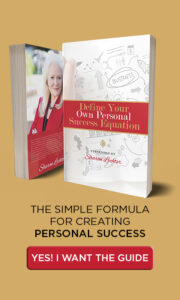Learning how to bounce back after a failure is a key skill we all need to acquire because we will all face failure in our lives…especially when we have big visions we want to make happen. When you can take a failure and use it to FUEL your success, instead of letting it hold you back, you will become truly unstoppable!
How do I change my mindset after failure?
When we experience failure, we can sometimes take it personally, which can hurt our mental health, hindering our ability to bounce back from it.
One of the big things to recognize is that experiencing failure doesn’t mean YOU are a failure.
Failure is simply a result of taking action or not taking action. It is not a way of being.
It is important to become conscious of the thoughts you have and the stories you are telling yourself. If your inner critic is getting out of control, it’s imperative to learn how to settle it down because you don’t want self-sabotage to lead to further failures.
My blog How to Make Change | A Quick Guide for Living a Better Life has a section that helps you work with your inner critic to move yourself past those negative thoughts toward a much more positive attitude and a brighter future.
From there, you will be ready to use any failure to FUEL your motivation and create the success you desire.
What is the best way to bounce back from failure?
Two things are important to understand about failure, so you can bounce back from it:
- We all experience it.
- Failure is data.
That second point can shift your perspective and put failure in a new light. When you can do that, you are ready to use your failure to FUEL your motivation. Here’s how:
Feel it. Facing failure isn’t easy for anyone. It’s disappointing when things don’t go the way we expect. When we are facing failure, it’s important to allow ourselves the time and space to feel the emotions that naturally come up. This is part of a highly developed emotional intelligence. By giving yourself that grace, instead of stuffing down the emotion and quickly moving on, you will allow yourself to process it properly and move forward.
If you don’t process the emotion, likely, you will still be emotional. HIGH EMOTION = LOW INTELLIGENCE. That means you won’t be able to make great decisions as you try to move forward because the dial on your ability to think critically gets turned down in times of stress. If you feel it and work through emotion, you will be able to look at the failure in a more analytical way, which is where the next step comes in.
Understand where it failed. Even though you didn’t get the result that you wanted, there were likely some things that worked and some things that didn’t. Dig in and analyze what happened from multiple angles. The more you can learn about what went wrong, and why it did so, the easier it will be to understand where it failed, so you can…
Evolve your approach. As I said above, failure is data. After you take the time to understand what happened you can now use the data you’ve collected to evolve your approach, amplifying the things that worked and altering the things that didn’t. Elite athletes are great at doing this. They watch videos of their movements or gameplay, and based on the data, they make small adjustments to improve their performance. They also start planning for the next time they compete, mentally rehearsing what they will do in each situation. That way, when it’s game time, their minds and bodies are ready to adapt to the circumstances so they can take on the challenge and win!
Get curious with this step and see how many ways you might be able to evolve your approach, then pick the one that you think will give you the best result. Then it’s time to…
Launch again! To truly recover from a failure, you have to launch again – especially if it’s something that matters to you. Since you evolved your approach and built a new strategy, taking action will give you a new result. If it doesn’t work this time, use the new data to evolve your approach another time and launch again. And again. And again.
Thomas Edison, after making thousands of adjustments and relaunches in his process of inventing the light bulb once said, “I have not failed 10,000 times—I’ve successfully found 10,000 ways that will not work.” The people who enjoy the greatest victories in life are the ones who can adjust their mindset, stay focused on their end goal, and make facing failure a part of their process for success.
Now that you have the steps to FUEL yourself when things don’t go your way, you too can become motivated when you face failure and use that new-found determination to make the things you want happen. That will build the wildly successful life you so richly deserve!
When you face failure and you aren’t sure what your next step should be, an outside perspective can help – especially in business. My husband, Mike, and I have built several multi-million-dollar businesses that were global successes. We were the strategic minds behind talking children’s books, the Rich Dad brand, and several Think and Grow Rich Series books.
We’ve had major successes, and along the way, we experienced a lot of failures too. We share our experiences and expertise in the monthly Lechter Mastermind Membership. By joining, you will get access to both of us, and you can share your biggest challenges, and successes too, so you can get immediate feedback!
That kind of guidance is the fastest way I know to turn a business failure into a successful action plan to get the results you want! CLICK HERE TO LEARN MORE ABOUT THE LECHTER MASTERMIND MEMBERSHIP.
“Sharon and Michael Lechter provided us with a customized step-by-step path to turn our book series into a multi-million-dollar lifestyle brand. The information learned under their mentorship was clear, honest, and linked to our best interests and those we serve. We are so grateful for mentors who don’t teach from a position of theory but from a lifetime of ‘been there, done that.’” – Dr. Dave Braun and Dr. Troy Amdahl, The Oola Guys – Best Selling Authors and founders of OolaLife.com and OolaTea.com.
Recent Posts
As people who are givers, taking time for self-care can feel selfish, but prioritizing our well-being is essential, not indulgent. To accentuate the point, think about a day when you …
Read More
As parents, we want our children to have more than we did, with a lot less struggle, but by making the road too easy for our children, we rob them …
Read More
Imposter syndrome is more common than you might think. Many people struggle with it, and like most people, I too have had periods where I struggled with confidence. Through those …
Read More





